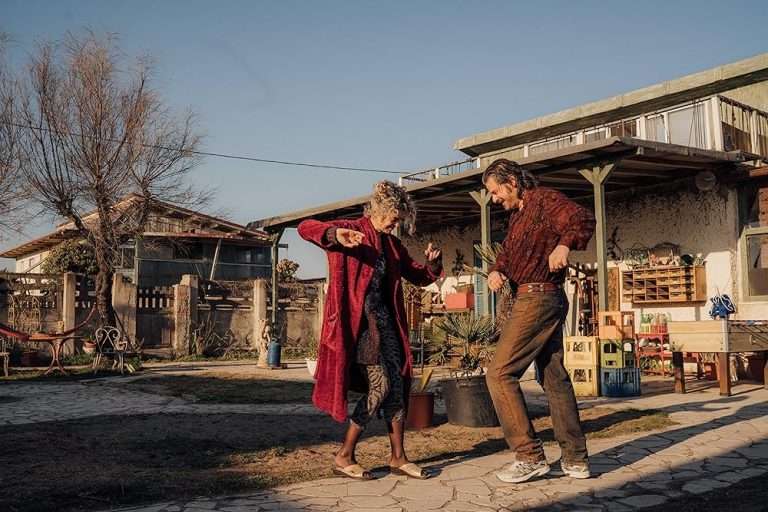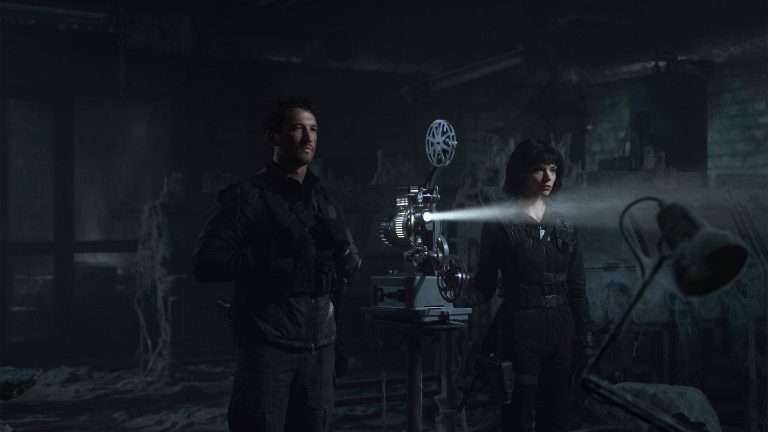There’s so much fun and buoyancy in Zacharias Mavroeidis’ “The Summer with Carmen,” yet it never comes at the expense of the film’s intelligence and reflexivity. Two gay friends vacationing on a beach run ideas off each other. The lanky Nikitas (Andreas Lampropoulos) is an actor now stepping into direction. Tired of being considered only for gay roles, he decides to make this switch so he can have more control.
His friend, Demosthenes (Yorgos Tsiantoulas), was also an actor who has transitioned into a career as a public servant. Quite like his name, he has the looks of a Greek god and a perfectly sculpted body. Together, they toss in the air and cobble together ideas for a film that Nikitas is keen on making. The producer’s diktat is that it must be sexy, Greek, and low-budget.
The two begin with envisioning a standard, three-act structure. The hero is Demosthenes, Nikitas’ friend. The hero should ideally have a goal and grow over the course of the narrative. But what should be the key plot points? After some debate, the two spin a meta tale that draws from circumstances that happened two summers earlier, when Demosthenes was fresh out of a breakup. But the ties still seem too strong.
The writing is sharp, witty, and loose-limbed. There’s a freeness to its spirited structure, a cheeky, delightful self-awareness that doesn’t turn too snarky for its own good. The two friends are written with affection, warmth, and sauciness while critically never pedestalised. They have their grouses and petty fights with each other. Resentments are articulated and shared. Mavroeidis doesn’t peddle coyness into the storytelling. The best, gleaming thing about the film is its sheer, unbridled candor, even as its characters try to escape glaring realizations.
The friends mull various openings and pathways the dreamt film could take. Soon, the boundaries between what actually transpired and fictional re-enactments playfully blur. What stays constant is the presence of Carmen, the dog that belonged to the ex, which Demosthenes starts taking care of. Carmen also becomes an emotional bridge between Demosthenes and his mother, who doesn’t actively resist but acknowledges the possibility of a relationship between him and his partner for the first time, though it comes too late.

“The Summer with Carmen” is zingy and biting. Like a good, too-honest friend, Nikitas keeps directing Demosthenes to acknowledge his damaging behavioral patterns of diving into hookups as a diversion from his own emotional stuntedness. But Demosthenes is in denial, even as he is pulled back time and again into a relationship that he himself insists is over. It was he who ended things with Panos (Nikolaos Mihas). Why would he rake it up again? He claims. It’s an unconvincing assertion because he keeps going back and palpably still nurses some hope in the relationship.
Crucially, this never becomes a question of self-pity. All this emotional muck is whittled out of the film in its commitment to a searching frankness. His flighty nature may often carry away Demosthenes, but he doesn’t wholly shut out his friend’s advice. How he absorbs it or at least recognizes the need to, given the high credence and truth in Nikitas’ assertions, posits itself as the template of the “hero’s growth” believed to be fundamental in a conventional structure.
“The Summer with Carmen” riffs on the influence of the movies and weaves grounded reckonings into the mix. The screenplay, by Mavroeidis and Xenofón Chalátsis, stays wonderfully light-footed, straddling a density of emotional insights into the self and the other. The acting is spry and shorn of dramatics. There are no heightened emotions on display.
What persists is a low-key, intimate grasp over friendship, the essence of casual intimacy and embracing what one demurs from owning up to. This is queer storytelling that’s just allowed to be on its own terms, warm and funny and piercing by turns. Overall, “The Summer with Carmen” earns its mischievous, inward-looking attitude to narrative making and individuality with vivacity and tenderness.




![Super Dark Times [2017]: Fantasia Film Festival Review](https://79468c92.delivery.rocketcdn.me/wp-content/uploads/2017/07/SuperDarkTimes_1-768x429.jpg)



![Dune [2021] Review: Denis Villeneuve Tackles Colonialism & Warmongering On An Epic & Often Hypnotic Canvas](https://79468c92.delivery.rocketcdn.me/wp-content/uploads/2021/10/dune_image-768x432.jpg)